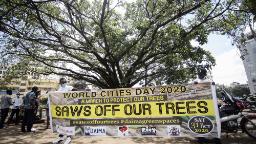
The presidential decree described the tree, the height of a four-storey building, as a “beacon of Kenya’s cultural and ecological heritage.”
The fig tree is considered sacred among Kenya’s most populous ethnic group, the Kikuyu.
Environmentalists had been campaigning against the planned destruction of the tree, which stands on Waiyaki Way in the west of the city, where engineers are building the expressway above the existing road on pillars.
“It is now a presidential declaration that this tree will be conserved,” Mohammed Badi, director general of Nairobi Metropolitan Services (NMS), told a news conference next to the tree.
The East African nation’s roads agency had said in October it planned to uproot and transplant it in order to erect a pillar to support the expressway.
The tree will be adopted by the NMS on behalf of the city’s residents and both the China Road and Bridge Corporation (CRBC) and the Kenya National Highways Authority have agreed to reroute the road.
The tree will now stand as a sign of the city’s aspirations, said Elizabeth Wathuti, a prominent Kenyan environmental activist.
“This particular fig tree is just a symbol of the bigger picture of what we are asking for. We want a green and clean city, and clean Kenya.”